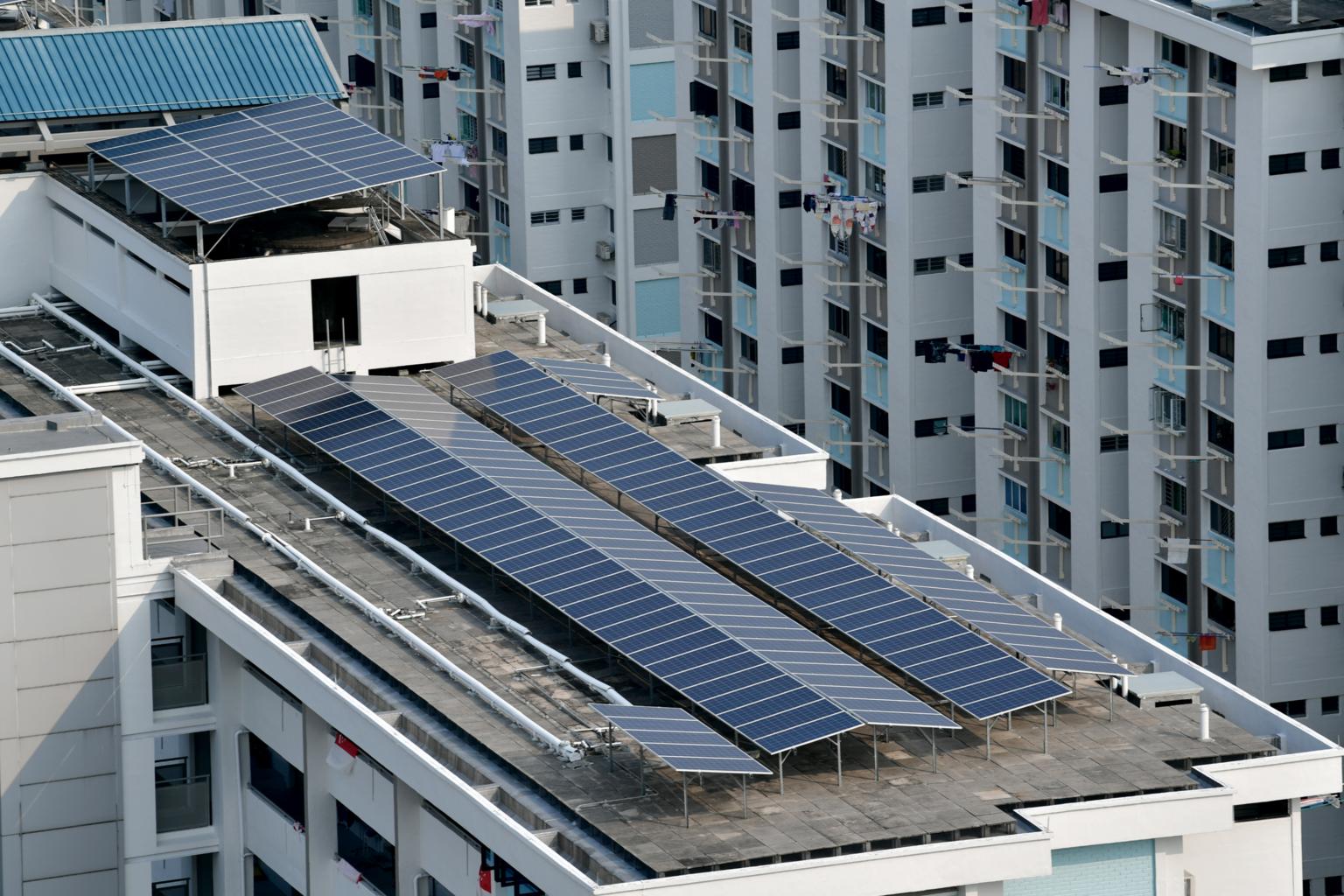Singapore can cut emissions through energy efficiency, solar energy, clean energy research: MTI
Sign up now: Get ST's newsletters delivered to your inbox

Singapore is pressing ahead with a goal of at least 2 gigawatt-peak by 2030.
PHOTO: ST FILE
SINGAPORE - Boosting energy efficiency, accelerating deployment of solar panels, and investing in research on emerging clean energy options are still Singapore's key strategies in cutting its carbon footprint.
The Ministry of Trade and Industry (MTI) said this to The Straits Times on Thursday (June 18), in response to queries on what Singapore's green transition plans are following news that other governments have pledged funds to reboot their economies in ways that are also climate-friendly.
Such "green stimulus plans" refer to packages aimed at rebuilding post-pandemic economies with elements directed at environmental goals, such as reducing the emissions of planet-warming gases.
Earlier this month, for example, Germany committed €130 billion (S$203 billion) to pandemic recovery, with about 30 per cent to be spent on activities that will cut emissions, Bloomberg reported.
This includes federal funds for the conservation and sustainable management of forests, increasing subsidies for electric and hybrid car purchases, and investing in renewable energy.
Closer to home, the South Korean government has said it will invest 76 trillion won (S$87 billion) by 2025 to reinvigorate its economy, with money set aside for eco-friendly measures, including the replacement of old fossil fuel-based utility systems with high-efficiency green energy ones, and more funds to set up infrastructure for the utilisation of solar, wind and hydrogen energy.
In Singapore, the Government has dedicated close to $100 billion - or nearly 20 per cent of GDP - to support Singaporeans in the battle against Covid-19, including schemes that protect jobs and help employers retain workers, as well as measures to help tide people over the economic lull.
An Emerging Stronger Task Force was also set up to drive industry transformation strategies in an economic landscape massively impacted by Covid-19, both globally and in Singapore.
But observers from the climate community in Singapore have noted that the 17-member task force includes representatives from sectors responsible for large emissions, specifically, the petrochemical and aviation sectors.
On Monday, an open letter signed by more than 45 individuals called for minority groups, vulnerable communities and green sectors of the economy to have greater representation in the task force.
The writers also said Singapore should focus on creating jobs in sectors that can reduce the impact of climate change.
Said one of the letter's signatories, Mr Ho Xiang Tian, co-founder of environmental site LepakInSG: "As we recover from the impacts of Covid-19, it is an opportunity to restructure the economy to one that leads to a more equitable society and stable climate for Singapore and the world," he said.
"The Emerging Stronger Task Force must include leaders in the circular economy, environmental protection, and low carbon sectors to ensure that we don't go out of the Covid-19 frying pan into the climate crisis fire."
Asked for MTI's comments on the issue, its spokesman said that as a small and highly urbanised city-state with low wind speeds, relatively flat land and a lack of renewables, Singapore has limited access to alternative clean energy options such as geothermal, wind, and tidal power.
He also noted that most of Singapore's electricity is generated by natural gas, the cleanest fossil fuel available.
The Government also has other plans to reduce the nation's carbon footprint, the spokesman said, pointing to schemes that had earlier been announced.
For example, Singapore has reached its 2020 solar deployment target of 350 megawatt-peak, he said, and is pressing ahead with a goal of at least 2 gigawatt-peak by 2030. This amounts to about 4 per cent of current energy demand.
There are also incentives, such as the Resource Efficiency Grant for Energy, to encourage companies to improve energy efficiency and reduce emissions, he said.
Added the MTI spokesman: "Working with the industry and research community, we are also studying emerging low-carbon technologies such as hydrogen and carbon capture, utilisation and storage, which could enable further decarbonisation of our economy in the longer term."
A spokesman for the climate group Singapore Youth For Climate Action noted that measures highlighted by MTI had been announced even before the pandemic hit economies around the world.
She said: "It's highly concerning that nothing has changed in the Government's plans for the green energy transition, even though the Covid-19 crisis offers just a taste of the shocks that are likely to come as the climate crisis progresses."
While the climate community welcomes the Government's efforts to work with researchers on low-carbon energy alternatives, there is potential for Singapore to boost efforts to transition away from its dependence on fossil fuels in other ways.
For example, similar to green transition plans elsewhere, research and development on solar deployment in Singapore could receive a larger boost, she said.
Added the spokesman: "The current economic climate serves as an opportunity to start the effective phasing out of carbon-intensive industries and to protect our Singapore from future global shocks and the looming climate crisis.
"It simply makes sense in the long term to really move forward with this transition."


